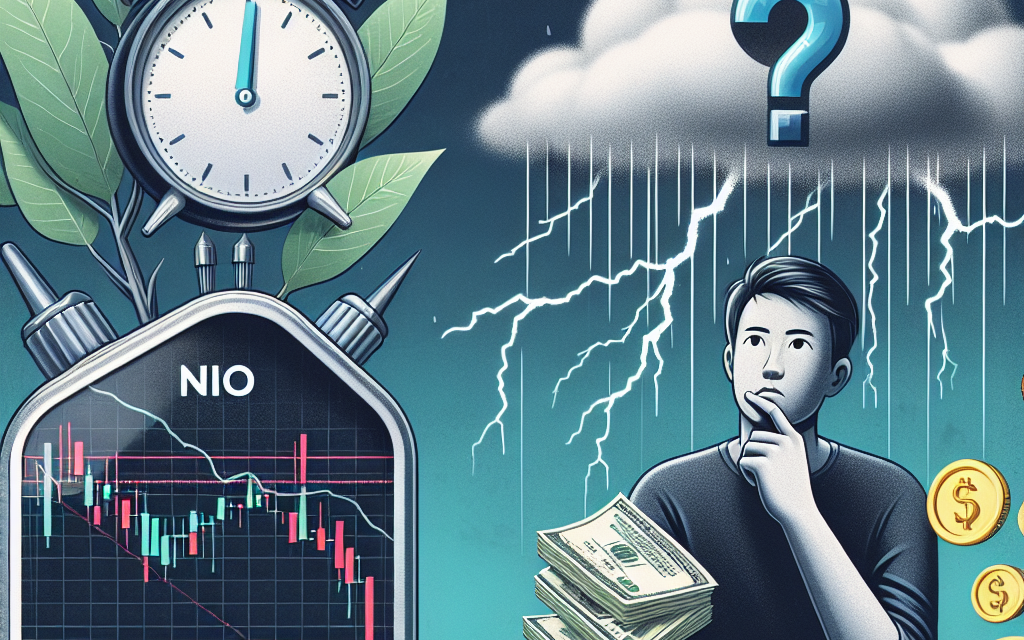“Seize the Opportunity: Invest in Nio Stock at a Bargain Below IPO Price!”
Introduction
Nio Inc., a prominent player in the electric vehicle (EV) sector, has captured the attention of investors worldwide since its initial public offering (IPO) in 2018. As the global shift towards sustainable transportation accelerates, Nio has positioned itself as a key competitor in the burgeoning EV market, particularly in China. However, recent market fluctuations have seen Nio’s stock price dip below its IPO level, prompting investors to reassess its potential as a lucrative investment opportunity. This situation raises a critical question: Is now the right time to invest in Nio stock? To answer this, one must consider a range of factors, including the company’s financial health, market position, growth prospects, and the broader economic environment. By analyzing these elements, investors can make informed decisions about whether Nio’s current valuation presents a strategic entry point or if caution is warranted in light of prevailing market conditions.
Understanding Nio’s Current Market Position
Nio, the Chinese electric vehicle (EV) manufacturer, has been a focal point of investor interest since its initial public offering (IPO) in 2018. As the company’s stock price has recently dipped below its IPO price, potential investors are questioning whether now is the opportune moment to invest. To make an informed decision, it is crucial to understand Nio’s current market position and the factors influencing its valuation.
Nio has positioned itself as a key player in the burgeoning EV market, particularly in China, which is the largest market for electric vehicles globally. The company has differentiated itself through its innovative battery-swapping technology, which offers a unique solution to the long charging times associated with electric vehicles. This technology not only enhances the convenience for users but also aligns with China’s infrastructure development goals, potentially giving Nio a competitive edge.
However, despite these innovations, Nio faces significant challenges. The global semiconductor shortage has disrupted production schedules across the automotive industry, and Nio is no exception. This shortage has led to delays in vehicle deliveries, impacting revenue and investor confidence. Moreover, the competitive landscape in the EV sector is intensifying, with both established automakers and new entrants vying for market share. Companies like Tesla and BYD are formidable competitors, each with their own strengths and market strategies.
In addition to these industry-specific challenges, broader economic factors are also at play. The global economy is experiencing volatility due to geopolitical tensions, inflationary pressures, and fluctuating energy prices. These factors contribute to market uncertainty, which can affect investor sentiment and stock valuations. For Nio, navigating these external pressures while maintaining growth and innovation is a delicate balance.
Despite these challenges, there are reasons for optimism regarding Nio’s future prospects. The Chinese government has been a strong proponent of electric vehicles, offering subsidies and incentives to both manufacturers and consumers. This supportive policy environment could bolster Nio’s growth trajectory. Furthermore, Nio’s strategic expansion into international markets, including Europe, signals its ambition to become a global player in the EV industry. This expansion could open new revenue streams and diversify its market presence.
Financially, Nio has shown resilience, with a steady increase in vehicle deliveries and revenue growth over recent quarters. The company has also made strides in improving its gross margins, a critical factor for long-term profitability. However, potential investors should be mindful of Nio’s cash flow and capital expenditure needs, as the company continues to invest heavily in research and development, infrastructure, and market expansion.
In conclusion, while Nio’s stock price falling below its IPO level may present a tempting opportunity, it is essential to consider the broader context of its current market position. The company’s innovative technology, supportive policy environment, and international expansion plans are promising. Yet, the challenges posed by supply chain disruptions, intense competition, and economic uncertainties cannot be overlooked. Investors should weigh these factors carefully, considering both the potential risks and rewards, before deciding whether now is the right time to invest in Nio stock. As with any investment, due diligence and a clear understanding of one’s risk tolerance are paramount.
Analyzing Nio’s Financial Performance
Nio Inc., the Chinese electric vehicle manufacturer, has been a focal point of interest for investors since its initial public offering (IPO) in 2018. As the company’s stock price has recently dipped below its IPO price, potential investors are contemplating whether this presents a lucrative opportunity or a risky venture. To make an informed decision, it is crucial to analyze Nio’s financial performance, which provides insights into its current standing and future prospects.
To begin with, Nio’s revenue growth has been noteworthy, reflecting its ability to capture market share in the burgeoning electric vehicle sector. The company has consistently reported increasing sales figures, driven by the rising demand for electric vehicles in China and its expanding product lineup. This growth trajectory is further supported by Nio’s strategic initiatives, such as the introduction of new models and the expansion of its battery swapping network, which enhances the convenience and appeal of its vehicles. However, while revenue growth is a positive indicator, it is essential to consider the broader financial picture.
Despite impressive revenue figures, Nio has faced challenges in achieving profitability. The company has reported significant losses in recent years, primarily due to high research and development expenses, marketing costs, and investments in infrastructure. These expenditures, while necessary for long-term growth, have weighed heavily on Nio’s bottom line. Consequently, potential investors must weigh the company’s growth potential against its current financial losses. It is important to note that Nio’s management has expressed a commitment to improving operational efficiency and reducing costs, which could pave the way for future profitability.
In addition to revenue and profitability, examining Nio’s balance sheet provides further insights into its financial health. The company has managed to maintain a relatively strong cash position, bolstered by capital raises and strategic partnerships. This financial cushion is crucial for sustaining operations and funding future growth initiatives. However, Nio also carries a significant amount of debt, which could pose risks if not managed effectively. Investors should consider the company’s ability to service its debt obligations while continuing to invest in growth.
Furthermore, Nio’s financial performance must be evaluated in the context of the broader market environment. The electric vehicle industry is characterized by intense competition and rapid technological advancements. Nio faces competition from both domestic players and international giants, which could impact its market share and pricing power. Additionally, regulatory changes and economic conditions in China could influence Nio’s performance. Therefore, understanding these external factors is essential for assessing the company’s financial prospects.
In conclusion, while Nio’s stock trading below its IPO price may appear attractive, a thorough analysis of its financial performance is imperative. The company’s robust revenue growth and strategic initiatives are promising, yet challenges related to profitability and debt management cannot be overlooked. Moreover, external market dynamics add another layer of complexity to the investment decision. Potential investors should carefully consider these factors, balancing the potential rewards against the inherent risks. Ultimately, the decision to invest in Nio stock should be based on a comprehensive evaluation of its financial health and market position, taking into account both current performance and future potential.
Evaluating the Electric Vehicle Industry Trends
The electric vehicle (EV) industry has been experiencing a transformative period, marked by rapid technological advancements and increasing consumer demand for sustainable transportation solutions. As a result, companies within this sector, such as Nio, have garnered significant attention from investors. Nio, a prominent Chinese electric vehicle manufacturer, has been at the forefront of this revolution, offering innovative designs and cutting-edge technology. However, recent fluctuations in its stock price, which has dipped below its initial public offering (IPO) price, have raised questions about whether now is the right time to invest.
To understand the potential of investing in Nio at this juncture, it is essential to evaluate the broader trends within the electric vehicle industry. The global push towards reducing carbon emissions has led to favorable regulatory environments for EV manufacturers. Governments worldwide are implementing policies to encourage the adoption of electric vehicles, including subsidies, tax incentives, and stringent emission standards for traditional internal combustion engine vehicles. These measures are expected to drive significant growth in the EV market over the coming years.
Moreover, technological advancements in battery technology are playing a crucial role in enhancing the appeal of electric vehicles. Improvements in energy density, charging speed, and overall battery life are making EVs more competitive with their gasoline-powered counterparts. As battery costs continue to decline, the affordability of electric vehicles is expected to improve, further boosting consumer adoption. This trend is particularly relevant for companies like Nio, which are heavily invested in developing proprietary battery technologies and innovative charging solutions.
In addition to technological and regulatory factors, consumer preferences are shifting towards more sustainable and environmentally friendly transportation options. This change in consumer behavior is driven by increased awareness of climate change and a growing desire to reduce personal carbon footprints. As a result, the demand for electric vehicles is expected to rise, providing a favorable market environment for companies like Nio.
However, despite these positive industry trends, potential investors must also consider the challenges facing Nio and the broader EV market. The industry is highly competitive, with numerous established automakers and new entrants vying for market share. This competition can lead to pricing pressures and the need for continuous innovation to maintain a competitive edge. Additionally, supply chain disruptions, particularly in the semiconductor industry, have posed significant challenges for EV manufacturers, impacting production timelines and delivery capabilities.
Furthermore, Nio’s financial performance and strategic initiatives must be carefully evaluated. While the company has demonstrated strong growth in vehicle deliveries and revenue, it has yet to achieve consistent profitability. Investors should assess Nio’s ability to scale its operations, manage costs, and expand its market presence, particularly in international markets where it faces stiff competition.
In conclusion, the decision to invest in Nio stock below its IPO price requires a comprehensive analysis of both the electric vehicle industry trends and the company’s specific circumstances. While the industry is poised for growth, driven by favorable regulatory environments, technological advancements, and shifting consumer preferences, challenges such as intense competition and supply chain disruptions must be considered. Ultimately, potential investors should weigh these factors carefully, considering their risk tolerance and investment horizon, to determine if now is the right time to invest in Nio.
Assessing Nio’s Competitive Advantages

In assessing Nio’s competitive advantages, it is essential to consider the broader context of the electric vehicle (EV) market and the unique position Nio holds within it. As the global shift towards sustainable transportation accelerates, Nio has emerged as a prominent player, particularly in the Chinese market, which is the largest EV market in the world. This positioning provides Nio with a significant advantage, as it can leverage its home market’s scale and government support for electric vehicles. Furthermore, Nio’s focus on innovation and technology has allowed it to differentiate itself from competitors, offering features such as battery swapping technology and a robust network of charging stations. These innovations not only enhance the user experience but also address common consumer concerns about EVs, such as range anxiety and charging time.
Moreover, Nio’s commitment to building a strong brand identity has been instrumental in establishing its competitive edge. The company has positioned itself as a premium brand, akin to Tesla, which appeals to a growing segment of consumers who value luxury and cutting-edge technology. This brand positioning is supported by Nio’s emphasis on design and quality, as well as its customer-centric approach, which includes initiatives like the Nio House community spaces and a comprehensive after-sales service network. These efforts have fostered a loyal customer base and enhanced brand recognition, both of which are crucial for long-term success in the competitive EV market.
In addition to its domestic strengths, Nio’s strategic plans for international expansion further bolster its competitive advantages. The company has already begun to enter European markets, where demand for electric vehicles is rising due to stringent environmental regulations and increasing consumer awareness of sustainability issues. By establishing a foothold in these markets, Nio can diversify its revenue streams and reduce its reliance on the Chinese market, thereby mitigating potential risks associated with market saturation or regulatory changes in China. This international expansion strategy is complemented by Nio’s partnerships with global technology and automotive companies, which provide access to new technologies and markets, enhancing its competitive position.
However, it is important to acknowledge the challenges Nio faces in maintaining its competitive advantages. The EV market is highly competitive, with numerous established automakers and new entrants vying for market share. Additionally, supply chain disruptions and fluctuating raw material prices can impact production costs and profitability. Despite these challenges, Nio’s focus on innovation, brand strength, and strategic expansion positions it well to navigate these obstacles and capitalize on the growing demand for electric vehicles.
In conclusion, while Nio’s stock price may currently be below its initial public offering (IPO) price, the company’s competitive advantages suggest potential for future growth. Its strong presence in the Chinese market, commitment to innovation, and strategic international expansion provide a solid foundation for long-term success. Investors considering Nio should weigh these competitive advantages against the inherent risks of the EV market, keeping in mind that the company’s ability to adapt and innovate will be key to sustaining its competitive edge. As the global transition to electric vehicles continues, Nio’s unique position and strategic initiatives may offer compelling opportunities for investors willing to navigate the complexities of this dynamic industry.
Risks and Challenges Facing Nio
Investing in Nio stock, particularly when it is trading below its initial public offering (IPO) price, presents a unique opportunity that is not without its risks and challenges. As with any investment, potential investors must carefully weigh these factors to make an informed decision. Nio, a prominent player in the electric vehicle (EV) market, has garnered significant attention due to its innovative approach and ambitious growth plans. However, several risks and challenges could impact its future performance and, consequently, the value of its stock.
One of the primary risks facing Nio is the intense competition within the electric vehicle industry. The market is not only dominated by established giants like Tesla but is also witnessing the entry of numerous new players, both from traditional automakers and startups. This competitive landscape necessitates continuous innovation and substantial investment in research and development, which can strain Nio’s financial resources. Moreover, the rapid pace of technological advancements means that Nio must consistently deliver cutting-edge products to maintain its competitive edge, a task that is easier said than done.
In addition to competition, Nio faces significant regulatory challenges, particularly in its home market of China. The Chinese government has been a strong proponent of electric vehicles, offering subsidies and incentives to promote their adoption. However, these policies are subject to change, and any reduction in government support could adversely affect Nio’s sales and profitability. Furthermore, the regulatory environment in China is complex and can be unpredictable, posing additional risks for Nio as it navigates compliance and operational hurdles.
Another challenge for Nio is its financial health. While the company has made strides in improving its balance sheet, it still faces the pressure of achieving sustainable profitability. Nio has historically operated at a loss, and although it has made progress in reducing its losses, the path to consistent profitability remains uncertain. This financial pressure is compounded by the need for significant capital investment to expand production capacity, develop new models, and enhance its technological capabilities. Consequently, Nio’s ability to manage its finances effectively will be crucial in determining its long-term success.
Moreover, Nio’s reliance on the Chinese market presents both an opportunity and a risk. While China is the largest market for electric vehicles, any economic slowdown or changes in consumer preferences could impact Nio’s sales. Additionally, geopolitical tensions and trade disputes could affect Nio’s supply chain and access to international markets, further complicating its growth prospects.
Despite these challenges, Nio has demonstrated resilience and adaptability, which are essential traits for navigating the dynamic EV landscape. The company’s focus on building a strong brand, coupled with its commitment to customer service and innovative business models, such as battery swapping, positions it well to capitalize on the growing demand for electric vehicles. However, potential investors must remain cognizant of the inherent risks and challenges that could impact Nio’s performance.
In conclusion, while Nio’s current stock price below its IPO level may appear attractive, it is imperative for investors to conduct thorough due diligence. Understanding the risks and challenges facing Nio is crucial in making an informed investment decision. As the electric vehicle market continues to evolve, Nio’s ability to address these challenges will play a pivotal role in determining whether now is indeed the right time to invest in its stock.
Long-term Growth Potential of Nio
Nio, the Chinese electric vehicle (EV) manufacturer, has been a focal point of investor interest since its initial public offering (IPO) in 2018. As the company’s stock price occasionally dips below its IPO price, potential investors are left pondering whether now is the opportune moment to invest. To make an informed decision, it is crucial to consider Nio’s long-term growth potential, which is influenced by several key factors.
Firstly, the global shift towards sustainable energy and the increasing demand for electric vehicles provide a favorable backdrop for Nio’s growth. Governments worldwide are implementing stringent regulations to reduce carbon emissions, thereby encouraging the adoption of EVs. In China, Nio’s primary market, the government has been particularly aggressive in promoting electric vehicles through subsidies and incentives. This supportive policy environment is likely to bolster Nio’s sales and market share in the coming years.
Moreover, Nio’s commitment to innovation and technology positions it well for long-term success. The company has consistently invested in research and development to enhance its product offerings. Nio’s vehicles are known for their cutting-edge technology, including advanced battery systems and autonomous driving capabilities. The introduction of battery-as-a-service (BaaS) is a testament to Nio’s innovative approach. This service allows customers to lease batteries separately from the vehicle, reducing the upfront cost and providing flexibility. Such innovations not only differentiate Nio from its competitors but also attract a loyal customer base.
In addition to technological advancements, Nio’s strategic partnerships and collaborations play a significant role in its growth trajectory. The company has formed alliances with various industry leaders to enhance its capabilities and expand its market reach. For instance, Nio’s collaboration with Mobileye, an Intel subsidiary, aims to develop autonomous driving solutions. These partnerships enable Nio to leverage external expertise and resources, accelerating its development and deployment of new technologies.
Furthermore, Nio’s expansion plans beyond China indicate its ambition to become a global player in the EV market. The company has already made inroads into the European market, with plans to enter other regions in the near future. This international expansion is expected to diversify Nio’s revenue streams and reduce its reliance on the Chinese market. As Nio establishes its presence in new markets, it is likely to encounter challenges, but the potential rewards could be substantial.
However, it is important to acknowledge the risks associated with investing in Nio. The EV industry is highly competitive, with numerous players vying for market share. Established automakers and new entrants alike are investing heavily in electric vehicles, which could impact Nio’s growth prospects. Additionally, fluctuations in government policies and economic conditions could pose challenges to Nio’s expansion plans.
In conclusion, while Nio’s stock price may currently be below its IPO level, the company’s long-term growth potential remains promising. The global shift towards electric vehicles, coupled with Nio’s focus on innovation, strategic partnerships, and international expansion, provides a solid foundation for future growth. Nevertheless, potential investors should carefully consider the inherent risks and conduct thorough research before making investment decisions. As with any investment, a balanced approach that weighs both opportunities and challenges is essential for success.
Expert Opinions on Investing in Nio Now
As investors navigate the ever-evolving landscape of electric vehicle (EV) stocks, Nio Inc. has emerged as a focal point of discussion, particularly given its current trading price below its initial public offering (IPO) level. This situation prompts a critical examination of whether now is an opportune moment to invest in Nio stock. To provide a comprehensive perspective, it is essential to consider expert opinions, which offer valuable insights into the potential risks and rewards associated with this investment.
To begin with, it is important to acknowledge the broader context of the EV market, which has experienced significant growth and transformation over recent years. Nio, often dubbed the “Tesla of China,” has positioned itself as a key player in this burgeoning industry. The company’s innovative approach, including its battery-as-a-service model and focus on premium electric vehicles, has garnered attention and praise. However, the current market conditions, characterized by economic uncertainties and fluctuating investor sentiment, have led to a decline in Nio’s stock price, raising questions about its future trajectory.
Experts who advocate for investing in Nio at this juncture often highlight the company’s strong fundamentals and strategic initiatives. They point to Nio’s robust sales growth, expanding product lineup, and strategic partnerships as indicators of its potential for long-term success. Furthermore, Nio’s commitment to research and development, coupled with its efforts to enhance production capabilities, underscores its determination to maintain a competitive edge in the EV market. These factors, according to some analysts, suggest that the current dip in stock price may present a buying opportunity for investors with a long-term perspective.
Conversely, there are experts who urge caution, emphasizing the challenges and uncertainties that Nio faces. The competitive landscape of the EV industry is intensifying, with numerous players vying for market share. Additionally, geopolitical tensions and regulatory changes in China, where Nio is headquartered, could pose risks to the company’s operations and growth prospects. Moreover, the global supply chain disruptions and rising raw material costs have added layers of complexity to the EV sector, potentially impacting Nio’s profitability and stock performance.
In light of these considerations, it is crucial for potential investors to weigh the potential rewards against the inherent risks. Diversification, a fundamental principle of investment strategy, may serve as a prudent approach for those considering Nio stock. By balancing their portfolios with a mix of established and emerging companies, investors can mitigate risks while capitalizing on growth opportunities within the EV sector.
Ultimately, the decision to invest in Nio stock below its IPO price hinges on individual risk tolerance, investment goals, and market outlook. While some experts remain optimistic about Nio’s future, others advise a more cautious stance, highlighting the need for thorough research and due diligence. As with any investment decision, it is imperative to stay informed and consider multiple perspectives before committing capital.
In conclusion, the question of whether now is the right time to invest in Nio stock is complex and multifaceted. By examining expert opinions and analyzing the broader market dynamics, investors can make informed decisions that align with their financial objectives. As the EV industry continues to evolve, Nio’s journey will undoubtedly be one to watch, offering both challenges and opportunities for those willing to navigate its path.
Q&A
1. **What is Nio?**
Nio is a Chinese electric vehicle (EV) manufacturer known for its premium electric cars and innovative battery-swapping technology.
2. **What was Nio’s IPO price?**
Nio’s IPO price was $6.26 per share when it went public on the New York Stock Exchange in September 2018.
3. **Why is Nio’s stock price below its IPO price?**
Nio’s stock price may be below its IPO price due to various factors, including market volatility, competition in the EV sector, regulatory challenges, or broader economic conditions affecting investor sentiment.
4. **What are the potential benefits of investing in Nio now?**
Potential benefits include capitalizing on the growing EV market, Nio’s technological innovations, and potential recovery or growth in the Chinese economy.
5. **What are the risks of investing in Nio at this time?**
Risks include market competition, regulatory changes, supply chain issues, and the company’s financial performance.
6. **How does Nio compare to its competitors?**
Nio competes with other EV manufacturers like Tesla, BYD, and Xpeng, with a focus on premium vehicles and unique services like battery swapping.
7. **What should investors consider before buying Nio stock?**
Investors should consider Nio’s financial health, market position, growth prospects, industry trends, and their own risk tolerance before investing.
Conclusion
Investing in Nio stock below its IPO price presents both opportunities and risks. On the one hand, the company’s position in the growing electric vehicle market and its potential for innovation and expansion could offer significant long-term gains. On the other hand, challenges such as market volatility, competition, and regulatory changes could impact its performance. Investors should carefully assess their risk tolerance, conduct thorough research, and consider broader market conditions before making a decision.





